Howdy cowboys and cowgirls,
Want to strike it rich? Gold is what made Nevada City popular and was once the most important mining town in the state, producing lots of gold. Many at the time wanted to make it rich, so families flocked to this area. Just like what happened there in real life, in Nevada City the board game, players will be building up the town quickly by controlling four starting family members to work on various tasks all with the goal to earn the most points after four years or four rounds in the game.
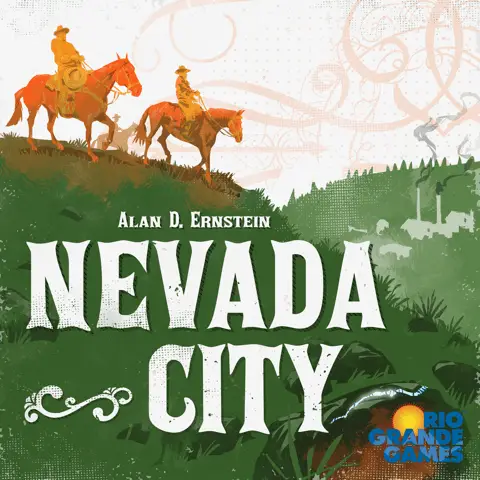
What’s in the box?
Nevada City comes in a medium size box that you would expect for a medium to heavy weight game like this one. The art takes you back to the wild west with colors matching the era of the game, and the components matching the type of game it is, a euro game.
Inside:
- Four panel Gameboard
- 22 building cards
- 4 homestead mats
- First player sherriff badge, and a deputy badge
- 72 property tiles and a bag
- 90 resource tokens
- 45 money
- 115 commodity tokens
- 4 pawns for keeping score
- 112 action markers
- 48 ownership markers
- 14 production market value cubes
- 24 character cards representing 6 different families
- 26 woker cards
- 8 goal cards
- 23 event cards
- 40 contract cards in 5 colors
- 4 reference cards
- 4 ranch gates
- 4 damaged building markers
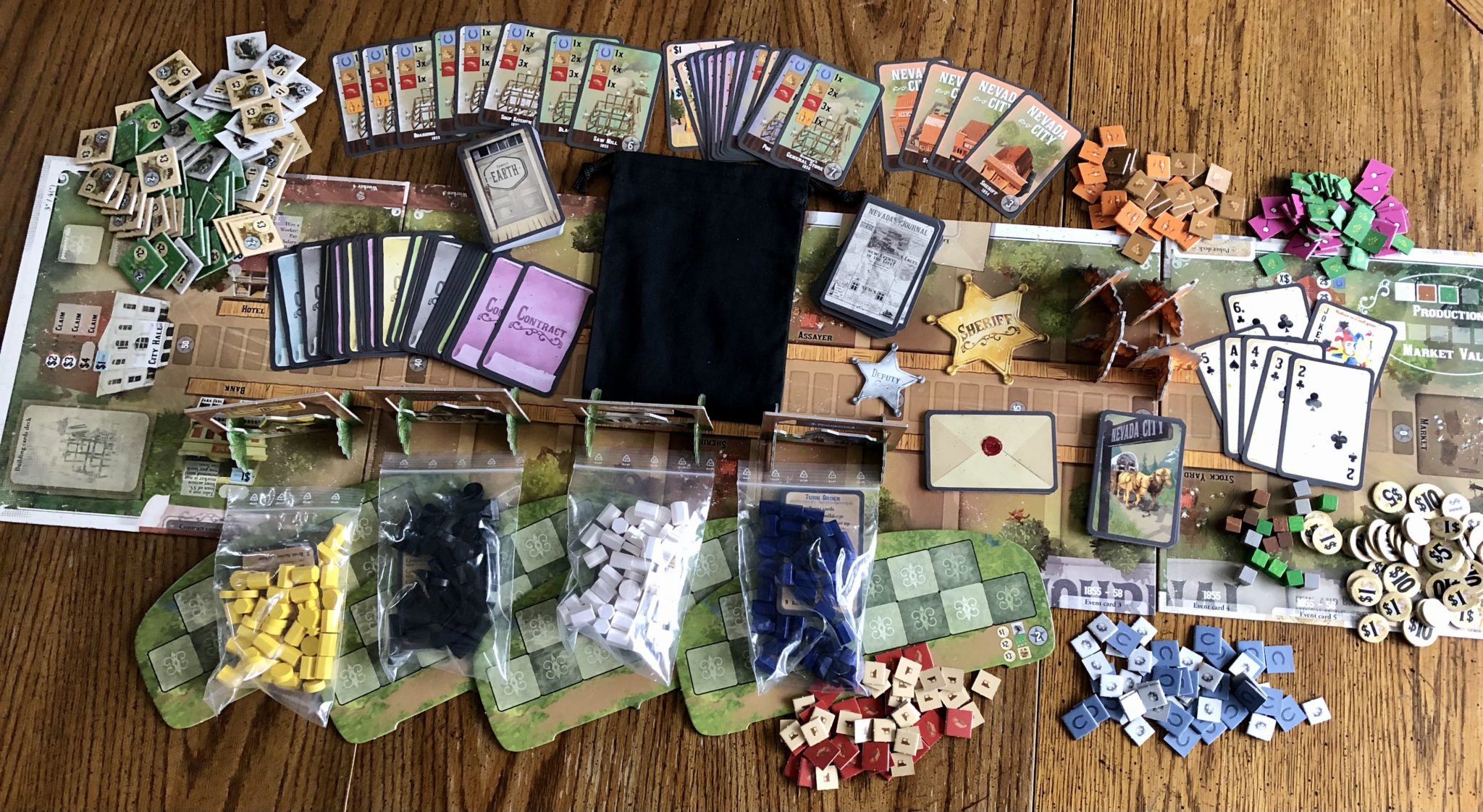
That’s enough components in the box for Nevada City to become a boomtown!
Don’t try to mine gold when you can sell shovels.
The gameboard will represent space available to build Nevada City, each space can be filled in with a building during the game, adding more spots for your family members to visit. There’s lots of work to do, so your family will need to know what they can do during your turn to develop this city.
Each player will have 4 family members to start out, with each family being different from one player to another. Each family member card will list how many actions that person can take on the top right of the card, and their skills are listed on the left side. You might want to try to use each family member efficiently using their skills to get more work done during your turn. As you play you will also have chances to hire additional workers who just might fall in love with one of your own family members, and when this is done, you will have additional turns during a round. The worker cards are very similar to your family member cards.
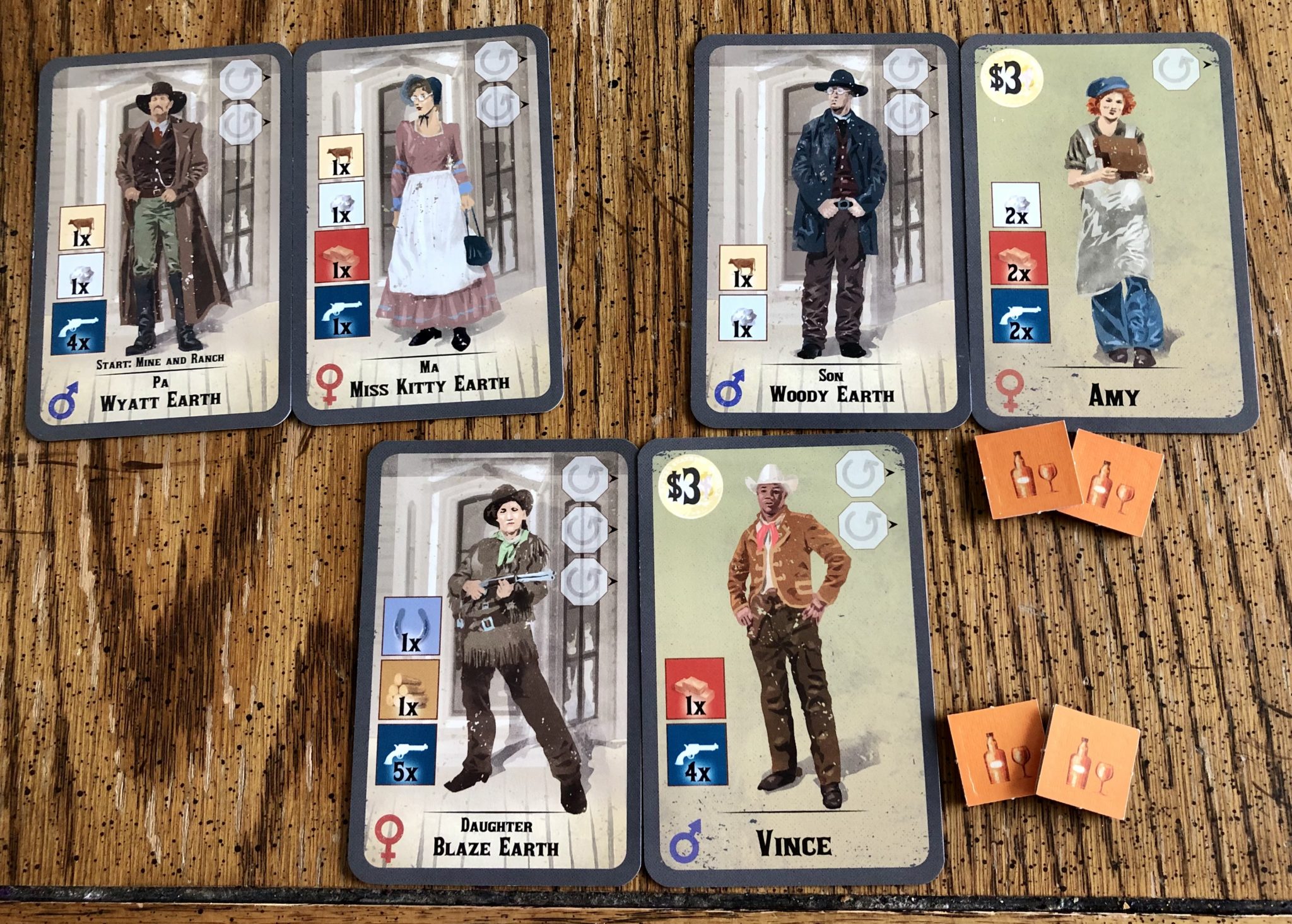
What kind of work needs to be done?
Families are trying to build up their family business and will need to farm, mine, build, celebrate, and face hardships such as fires, droughts, and dangerous travelers as life isn’t all perfect in the wild west. Players represent leader of fictional families from the Old West. The player who gains the most points by the end of the final year will become the new mayor of Nevada City. The game is played over 4 years or rounds with each round being variable depending on the number of family and worker cards that each player has. The game starts with no much happening in the city in 1855 and ends in 1858 where you can see how booming the town had become.
Stake a Claim on the Game
So here is how it goes, at the beginning of each round an event card is revealed with either. Immediate change or a continuous effect that last the time listed on the card. Players take turns, starting with the sheriff, activating one of their family members and then taking all the actions they would like that family member to perform, probably 2 or 3 actions. You can visit an already build location on the board that has an octagon shape, matching the shape of your action markers, build a new building paying its resources, farm, ranch, mine, reserve a contract, or work on an already reserved contract, or complete a contract.
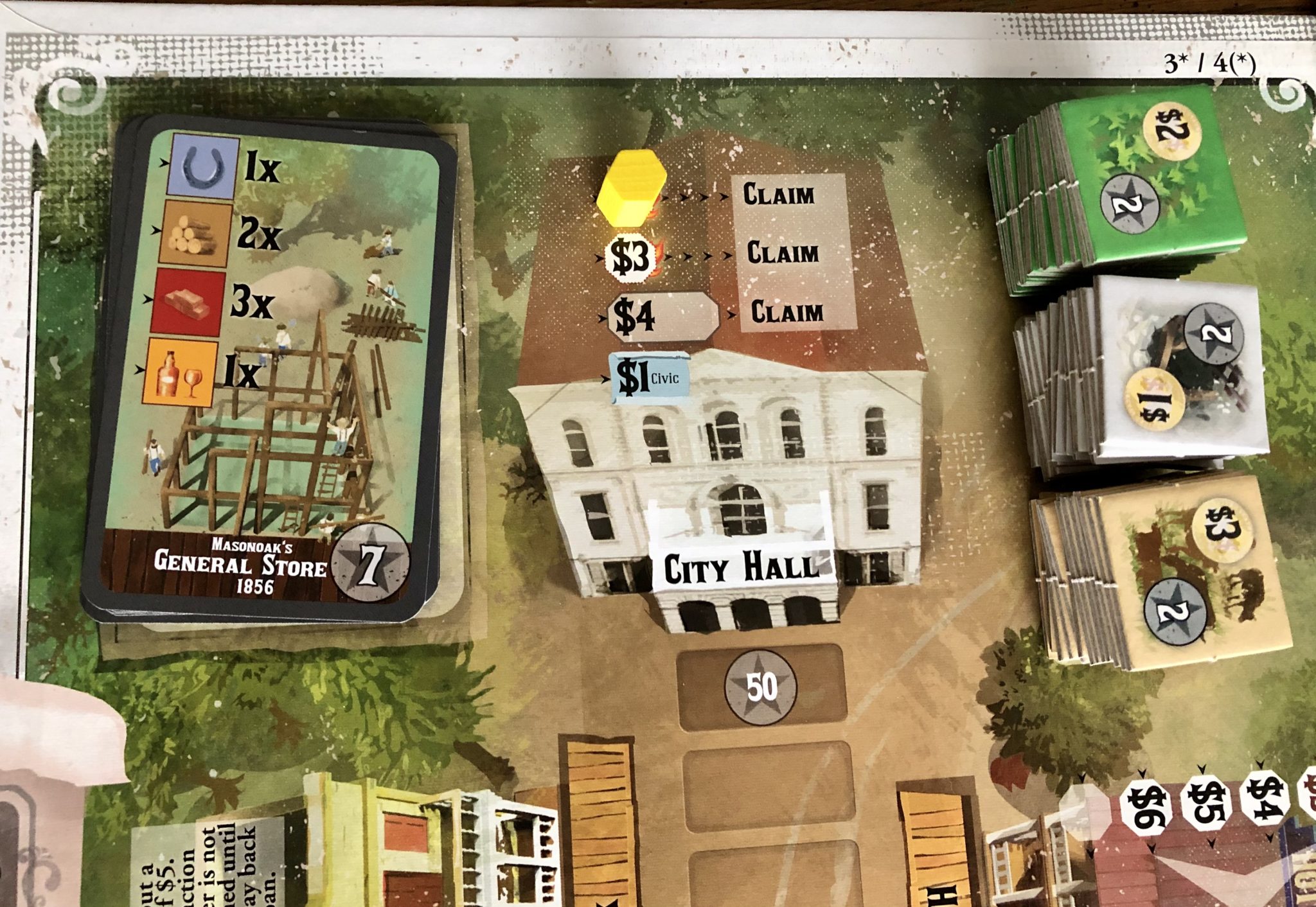
Work the Land
Farming, mining, and ranching are similar but produce different resources. Working these areas will let you add the number of that resource shown on the production track on the main board. If that family member also has a skill matching the chosen action, then they can farm, mine, or ranch another plot to gain additional resources. Players each have their own board with potential plots where they can add these properties to work them to gain resources.
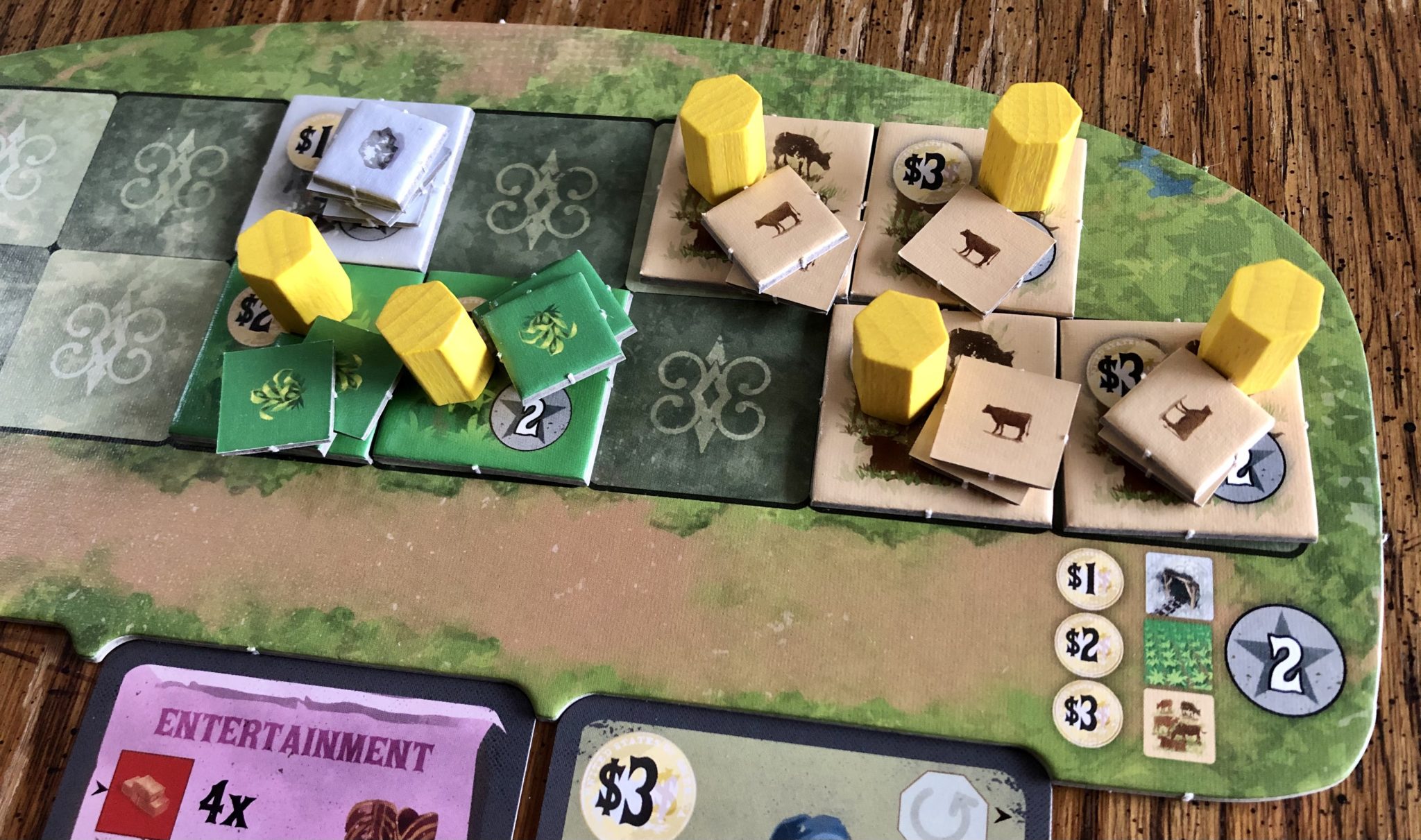
Visit Nevada City
In town a family member can visit any building taking its action but each character can only take one action in each available building. But be careful as to which buildings you visit because if its owned by another player, you might end up paying them to visit it. So you might want to visit City Hall where you can claim a building card or property tile. But if taking a building card, you will still need to build it by paying all the needed construction materials needed. And when built, an ownership marker is place on the bottom right so you can get paid when someone else uses that building.
But just as important as purchasing building cards, property tiles will let you work your land hard giving you more to farm, mine, or ranch. Once you have taken all the actions to gain a building card and pay its materials needed for construction it will be turned into a new location for anyone to visit. Also remember, certain family members can help build these buildings better than others. Lastly, in town a player can pick up, work on, or complete a contract. Contracts require goods to complete and will award points to that player for completing that contract plus additional points for the player who fulfills an additional listed requirement like constructing a certain building.
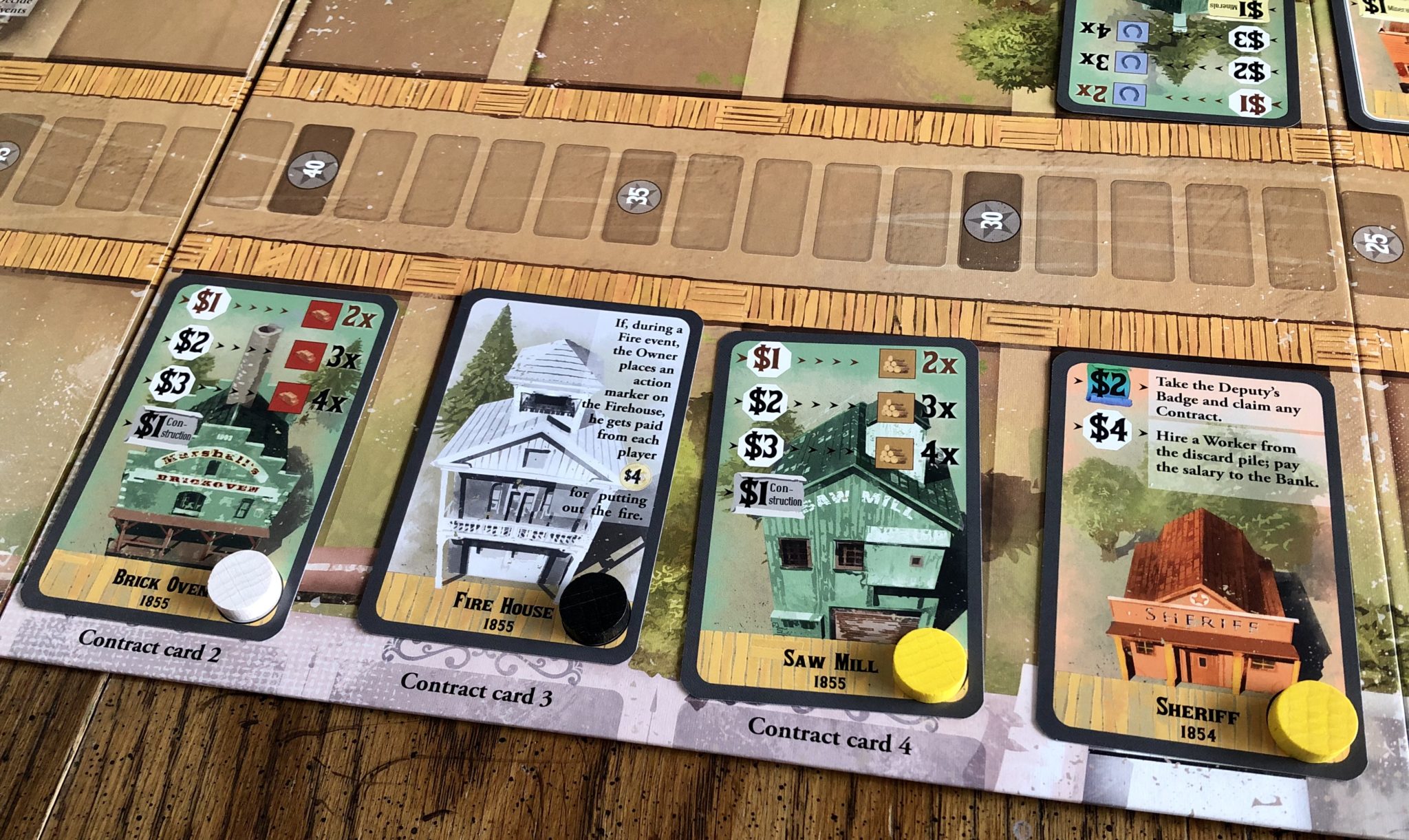
After each year, or complete round, and after each player has activated each family member, new buildings are added that can be built, production and the market are reset, and the board is reset for the next year. After 4 years, the player with the most points wins.
The Verdict
This is a very underrated euro game that didn’t cause a splash as much as I think it should have. The game came out in 2020 by Rio Grande Games and designed by Alan Ernstein who has designed other previously published games, with Nevada City being his best yet.
Nevada City gives you a feeling of taking care of your family members and assigning them to work where they will do the best. Although all families are different, everyone will start with 9 action tokens total split between the 4 members. Some might have a many as four, or as low as one. Some families might have a focus on certain aspects of the game, which players should take advantage of. Some can mine silver better, some can farm better, others might be able to construct buildings better. Players all will then start asymmetrically.
The game doesn’t take long to figure out, and players will be able to understand their choices in the game after 1 or 2 turns. Turns give players excitement as each action token is placed out to gain resources from a hard day’s work, commodities from trading or working, or making plans to construct or actually constructing a building that will give you points, and more abilities.
The fun of placing your tokens for each family member has a feeling of accomplishment and progression, which also is followed by the progression of constructing more and more buildings giving more worker placement spots that benefit all players. The benefit for the owner is some extra money, and the benefit of the other players is an increase in efficiency to produce or exchange commodities or do whatever the building’s purpose is. So, you keep feeling like you’re progressing and doing something in the game, even though some players might be doing better than others.
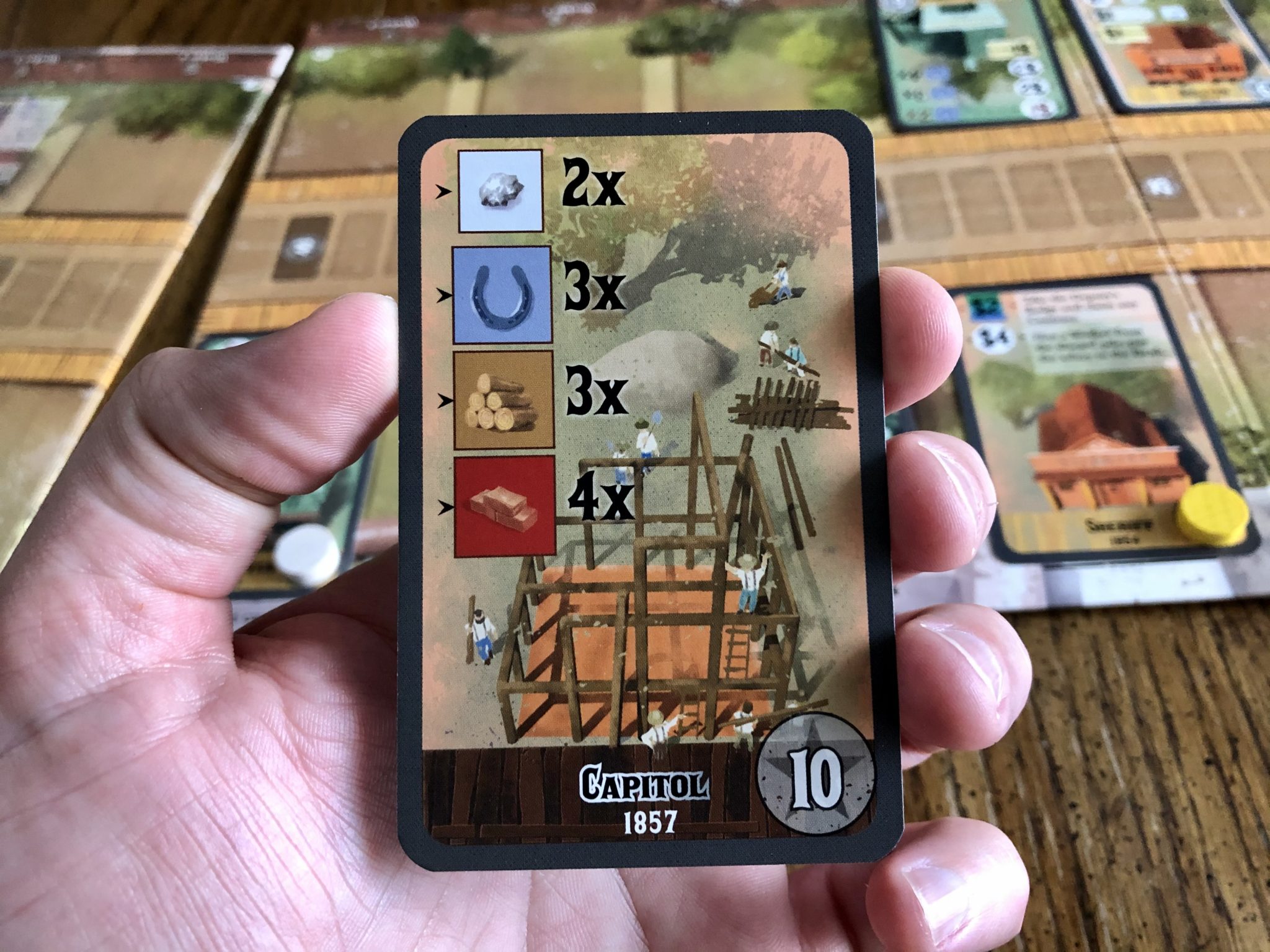
Actions for Nevada City
On your turn you active a family member and place all their action markers somewhere to take actions depending on the number of action tokens that person has. They might go work the land to gain resources, visit already built buildings to take actions to acquire commodities. You can visit City Hall to claim a specific building you want to build, or you can visit that building to actually build it spending all required commodities.
Buildings in Nevada City
Deciding on what buildings go into play is a huge part of the game and strategy. The buildings give huge benefits and rewards players for building them. The buildings are also tied to the contracts as you can gain additional points whenever someone accomplishes a contract with your building listed on it. It’s neat how the game is designed where the buildings are intertwined with the contracts which give points, and the worker placement areas to give you better actions.
The types of buildings also change with years in the game as they help players produce basic commodities at the beginning of the game so everyone has a way to build more buildings that will help give points, convert commodities, or give advantages. Out of everything in the game, the buildings are key, but don’t neglect the other tasks, especially the contracts at the end of the game, because they will be the best way to score points using only 1 of your action markers.
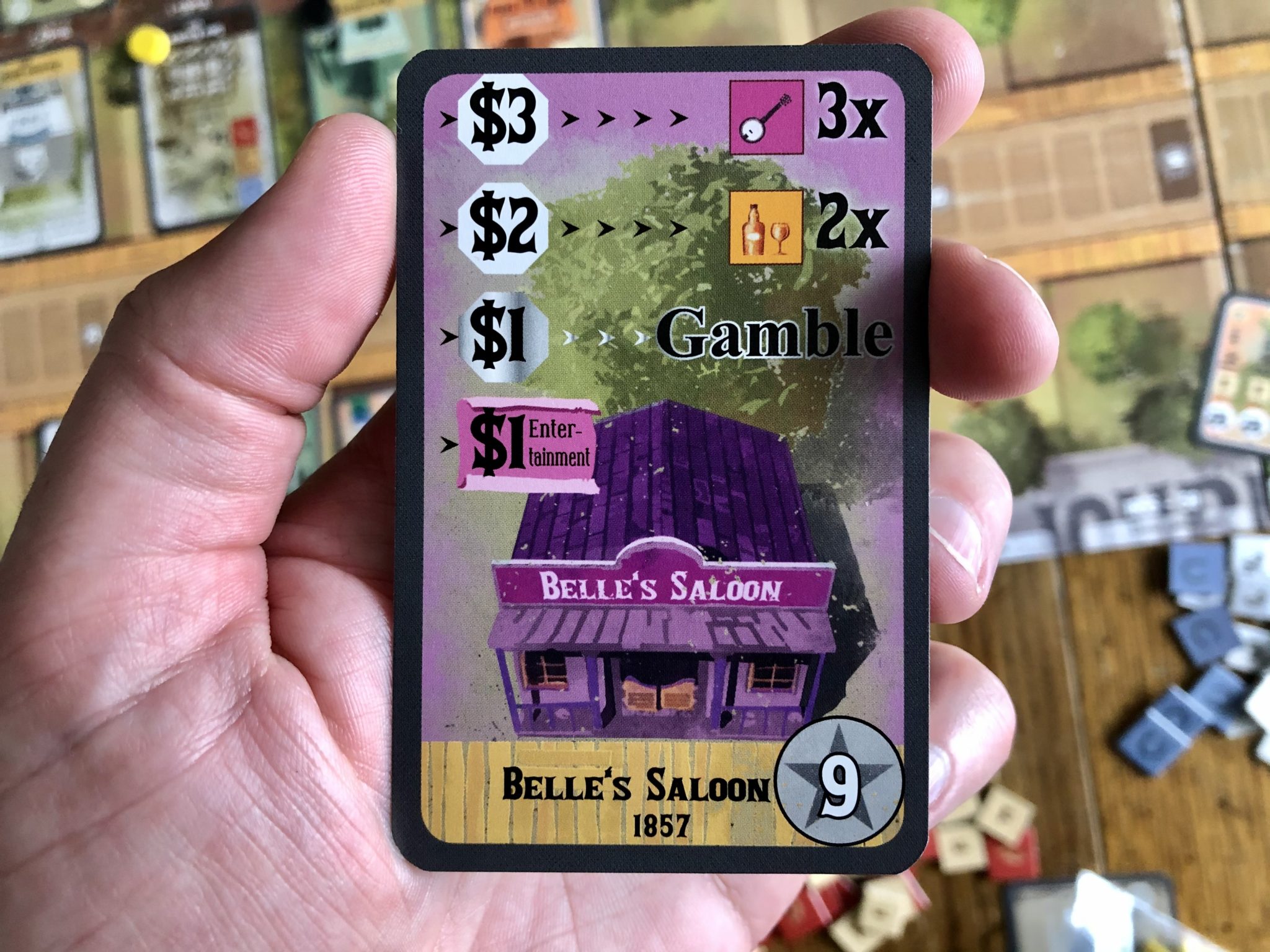
Add to Your Family
You start the game with a ma, pa, son and daughter. While playing the game you can hire workers to give you more actions to take that year, which can be a very good idea. At the end of the year if you would like, you can pay some commodities and resources to throw a wedding and keep the hired worker as part of your family. And in this game, you don’t need to feed your family, so you essentially gain more action token markers to do more stuff in the game.
The earlier you do this, the more you can take advantage of the extra actions, but it can be difficult to throw 2 weddings in the same year, but possible. Later in the game when you have 6 family members now, you can still hire workers giving you even more actions to perform in that year.
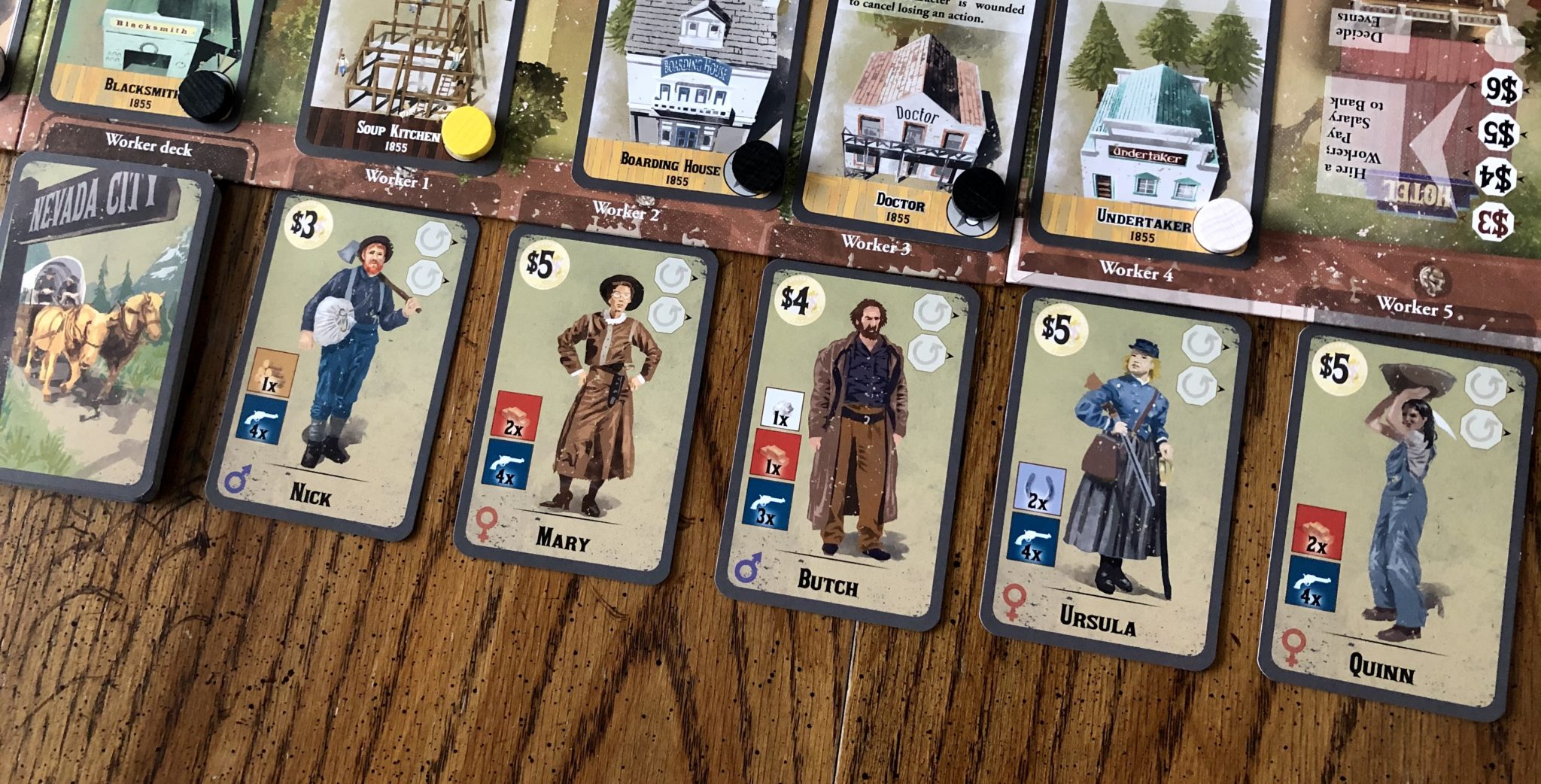
Production and Market
This was one of the best things in the game for me, different years or even during a year the production of certain resources would change, also changing the market for how much each resource is worth. Some years it might be better to invest in one resource over another, and these tracks are setup by having some cubes permanent and others randomly drawn from a bag and placed out.
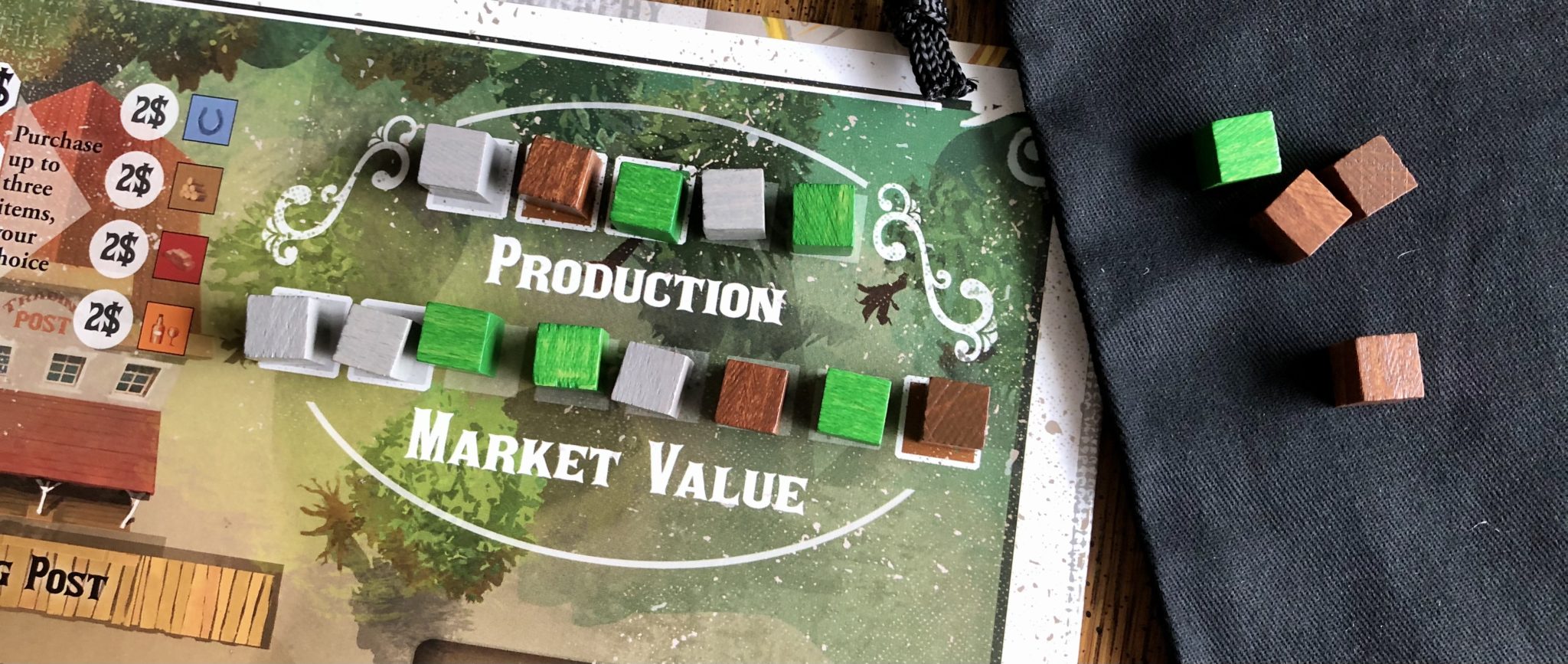
Have strong thoughts about this piece you need to share? Or maybe there’s something else on your mind you’re wanting to talk about with fellow Fandomentals? Head on over to our Community server to join in the conversation!
Images courtesy of Rio Grande Games
[rwp_box id=”0″]

